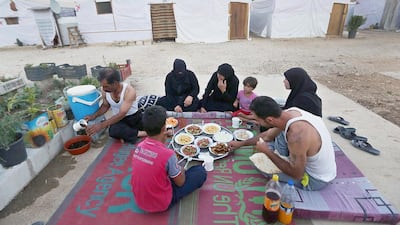BEIRUT // Abu Khaled Ramadan used to run a supermarket in Damascus. Recently, he was forced to rummage through bins in Beirut to feed his family of five.
Mr Ramadan had been relying on the World Food Programme until it cut off food aid for 1.7 million Syrian refugees earlier this month.
The payments have since resumed but the funding crisis highlights both the precarious existence of those forced to flee the Syrian conflict and the scale of the challenge facing the UN body.
The suspension of aid caused panic among refugees.
For months, the WFP had warned that it was running out of money as it dealt with the biggest aid operations in its history.
The refugees received a text message saying the monthly payments of US$30 (Dh110.2) per person would be suspended indefinitely due to lack of funds. The timing was especially tough — just as snow was beginning to fall and temperatures were dropping.
In Jordan and Lebanon, where 1.1 million people were left without the food aid, refugees flooded hotlines, mostly to ask whether the news was true.
“I was furious. What we get is already not enough,” said Abu Khaled Ramadan, 65, who lives in a one-bedroom apartment in the Shatila refugee camp on the outskirts of Beirut. He started rummaging through rubbish.
“I began to search through food that people throw away, to find maybe a piece of bread. I also search through bins outside supermarket[s] for expired produce,” he said.
Mr Ramadan fled Damascus two years ago, where he ran his large supermarket. His family immediately started rationing their food after receiving the WFP text message. They cut out their breakfast of bread, olives and tea and settled for just a lunch and evening meal.
The WFP launched a crowd funding campaign to plug a $64m gap in their budget for December. A week later, $88m had been pledged with big donations from Saudi Arabia, the Netherlands and the EU. Yet it could well happen again. The money raised is only enough to get the agency through December and a part of January.
The UN agency resumed food aid for 1.7 million refugees last Tuesday.
The agency admits it is living from hand to mouth, much as its 6 million Syrian beneficiaries would say they are doing. The WFP insists that it had no other choice than to cut off refugees. “We didn’t have the money,” said Syria crisis spokeswoman Joelle Eid.
When the agency runs low on money, there are two options. It can cut rations and spread the remaining funds over multiple months, as it chose to do within Syria back in September. Or it can distribute the full amount in anticipation of raising the required amount on time. This time the WFP opted for the latter option for refugees in neighbouring countries. “Because refugees need assistance we gave full value,” said Ms Eid.
The agency points to the fact that they have warned since September that the cutting of aid to Syrian refugees, both within and outside Syria, was possible due to lack of funding. The September warning triggered a $120m donation by the United States, which allowed WFP to continue distributing throughout October and November.
The publicity storm caused by the December cut in funding spurred more than 10,000 people to donate to the crowd funding campaign, raising $1.8m. More importantly, the public outcry spurred on governments to open their wallets.
Public pressure is instrumental in getting governments to give, said professional fund-raiser John Baguley, CEO of International Fundraising Consultancy, which has helped other UN agencies to raise money. Although he believes WFP genuinely ran out of funds, he said the reason the campaign was such a success is the fact that aid was no longer available. “When you say we don’t have anything it works much better than if you say we almost don’t have anything.” The risk, however, is that it’s a one-off move, in terms of fund-raising, as the public will no longer respond in a similar manner. “You can’t do it again,” he said.
At current levels of funding, aid to 4.25 million people that WFP supplies with food within Syria will have to be cut by February. Rather than electronic cash transfers, such as those provided to refugees in neighbouring countries, within Syria WFP provides actual food. That allows less flexibility; the 3,000 lorries delivering aid to Syria need to be stocked two weeks before distribution. Thus funding needs to be secured by mid-January to allow for food deliveries in February.
It is not surprising that we have reached this point again, as the Syrian crisis is dealt with in spikes, said Dr Christopher Phillips, an associate fellow in Chatham House’s MENA programme. “I remember the end of last year when the Gulf states were guilted into giving greater donations, and now they make a big point of these donations to gain some political capital, or at least moral capital,” he said.
The UN is forced to rely on the same parties for their large donations, usually the Gulf and the US. As the size of the crisis increases and the attention of the world decreases, the funding crisis is only likely to grow, Dr Phillips says. “In the long term this is not a sustainable model; expecting the Gulf states to bail you out.”
foreign.desk@thenational.ae

